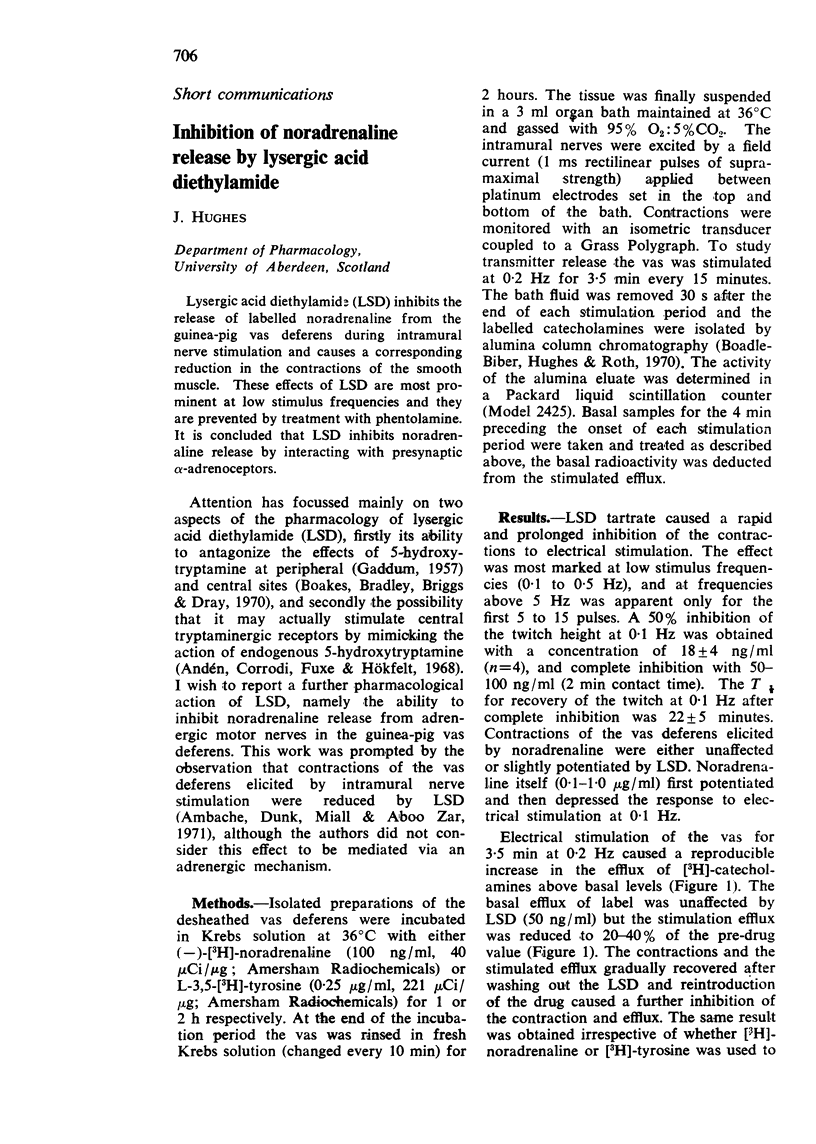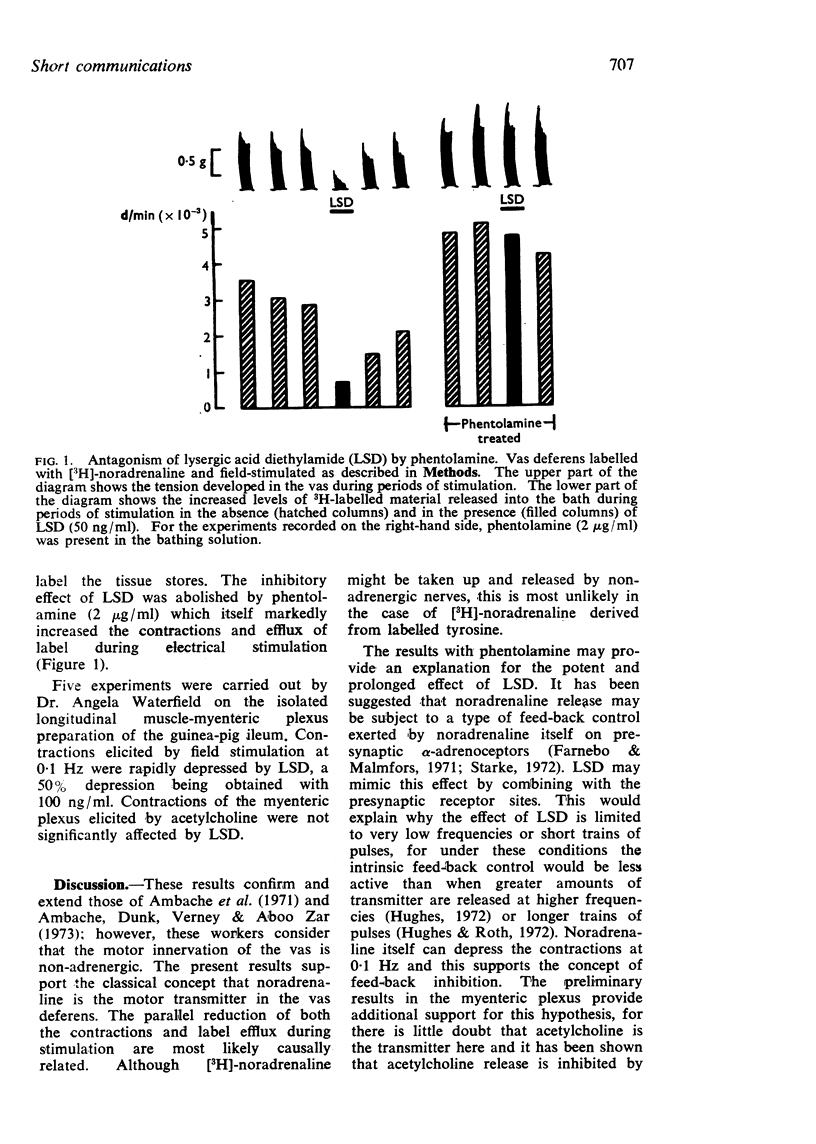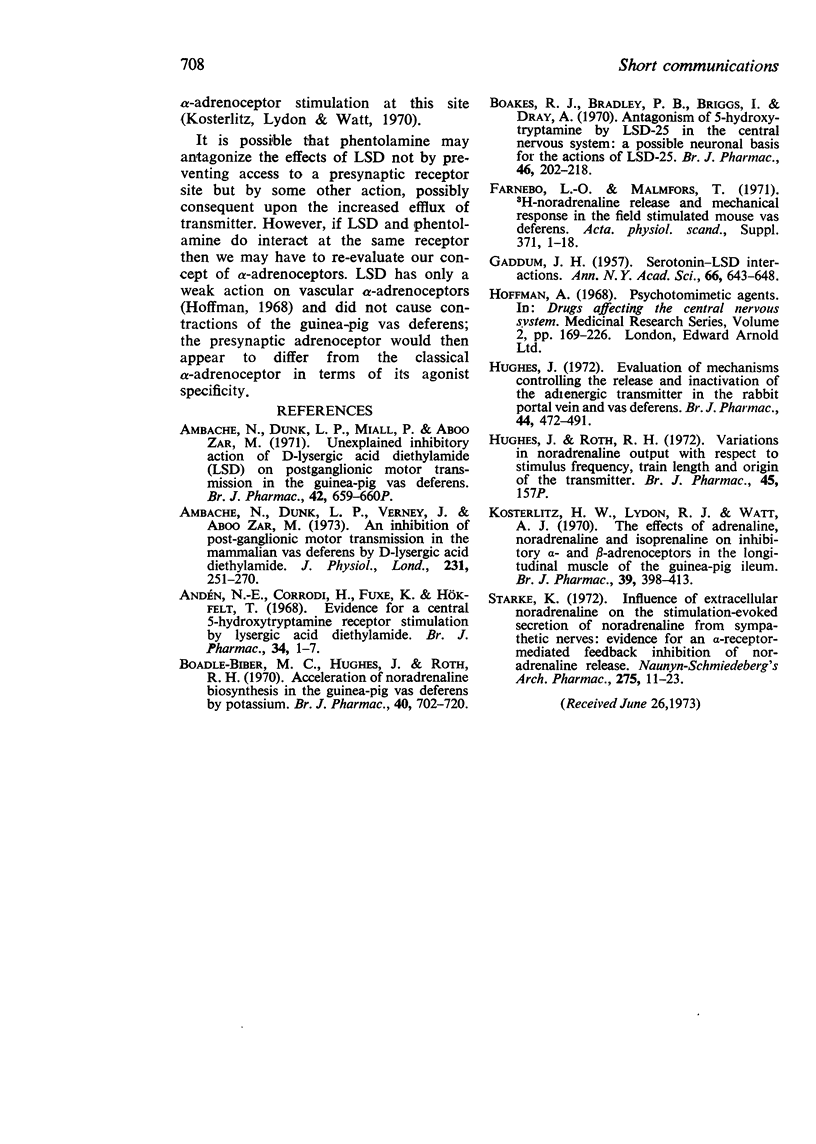Abstract
Lysergic acid diethylamide (LSD) inhibits the release of labelled noradrenaline from the guinea-pig vas deferens during intramural nerve stimulation and causes a corresponding reduction in the contractions of the smooth muscle. These effects of LSD are most prominent at low stimulus frequencies and they are prevented by treatment with phentolamine. It is concluded that LSD inhibits noradrenaline release by interacting with presynaptic α-adrenoceptors.
Full text
PDF


Selected References
These references are in PubMed. This may not be the complete list of references from this article.
- Ambache N., Dunk L. P., Miall P., Zar M. A. Unexplained inhibitory action of D-lysergic acid diethylamide (LSD) on postganglionic motor transmission in the guinea-pig vas deferens. Br J Pharmacol. 1971 Aug;42(4):659P–660P. [PMC free article] [PubMed] [Google Scholar]
- Ambache N., Dunk L. P., Verney J., Zar M. A. An inhibition of post-ganglionic motor transmission in the mammalian vas deferens by D-lysergic acid diethylamide. J Physiol. 1973 Jun;231(2):251–270. doi: 10.1113/jphysiol.1973.sp010231. [DOI] [PMC free article] [PubMed] [Google Scholar]
- Andén N. E., Corrodi H., Fuxe K., Hökfelt T. Evidence for a central 5-hydroxytryptamine receptor stimulation by lysergic acid diethylamide. Br J Pharmacol. 1968 Sep;34(1):1–7. doi: 10.1111/j.1476-5381.1968.tb07943.x. [DOI] [PMC free article] [PubMed] [Google Scholar]
- Boadle-Biber M. C., Hughes J., Roth R. H. Acceleration of noradrenaline biosynthesis in the guinea-pig vas deferens by potassium. Br J Pharmacol. 1970 Dec;40(4):702–720. doi: 10.1111/j.1476-5381.1970.tb10648.x. [DOI] [PMC free article] [PubMed] [Google Scholar]
- Boakes R. J., Bradley P. B., Briggs I., Dray A. Antagonism of 5-hydroxytryptamine by LSD 25 in the central nervous system: a possible neuronal basis for the actions of LSD 25. Br J Pharmacol. 1970 Oct;40(2):202–218. doi: 10.1111/j.1476-5381.1970.tb09914.x. [DOI] [PMC free article] [PubMed] [Google Scholar]
- Farnebo L. O., Malamfors T. 3 H-noradrenaline release and mechanical response in the field stimulated mouse vas deferens. Acta Physiol Scand Suppl. 1971;371:1–18. doi: 10.1111/j.1748-1716.1971.tb05210.x. [DOI] [PubMed] [Google Scholar]
- GADDUM J. H. Serotonin-LSD interactions. Ann N Y Acad Sci. 1957 Mar 14;66(3):643-7; discussion, 647-8. doi: 10.1111/j.1749-6632.1957.tb40754.x. [DOI] [PubMed] [Google Scholar]
- Hughes J. Evaluation of mechanisms controlling the release and inactivation of the adrenergic transmitter in the rabbit portal vein and vas deferens. Br J Pharmacol. 1972 Mar;44(3):472–491. doi: 10.1111/j.1476-5381.1972.tb07285.x. [DOI] [PMC free article] [PubMed] [Google Scholar]
- Hughes J., Roth R. H. Variations in noradrenaline output with respect to stimulus frequency, train length and origin of the transmitter. Br J Pharmacol. 1972 May;45(1):157P–157P. [PMC free article] [PubMed] [Google Scholar]
- Kosterlitz H. W., Lydon R. J., Watt A. J. The effects of adrenaline, noradrenaline and isoprenaline on inhibitory alpha- and beta-adrenoceptors in the longitudinal muscle of the guinea-pig ileum. Br J Pharmacol. 1970 Jun;39(2):398–413. doi: 10.1111/j.1476-5381.1970.tb12903.x. [DOI] [PMC free article] [PubMed] [Google Scholar]
- Starke K. Influence of extracellular noradrenaline on the stimulation-evoked secretion of noradrenaline from sympathetic nerves: evidence for an -receptor-mediated feed-back inhibition of noradrenaline release. Naunyn Schmiedebergs Arch Pharmacol. 1972;275(1):11–23. doi: 10.1007/BF00505064. [DOI] [PubMed] [Google Scholar]


